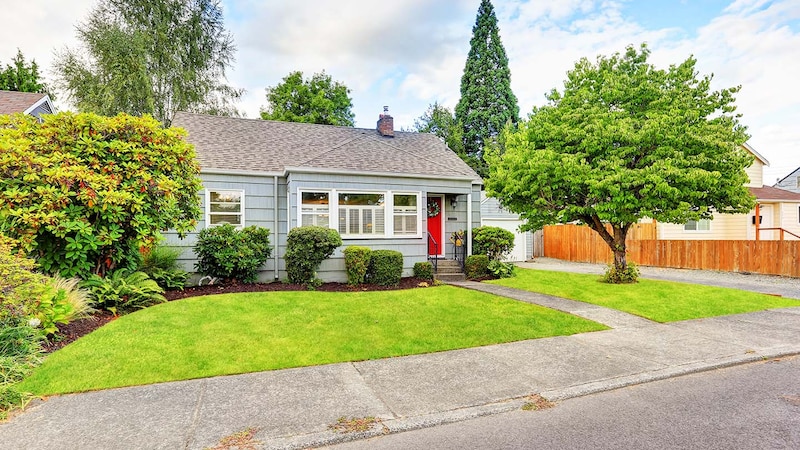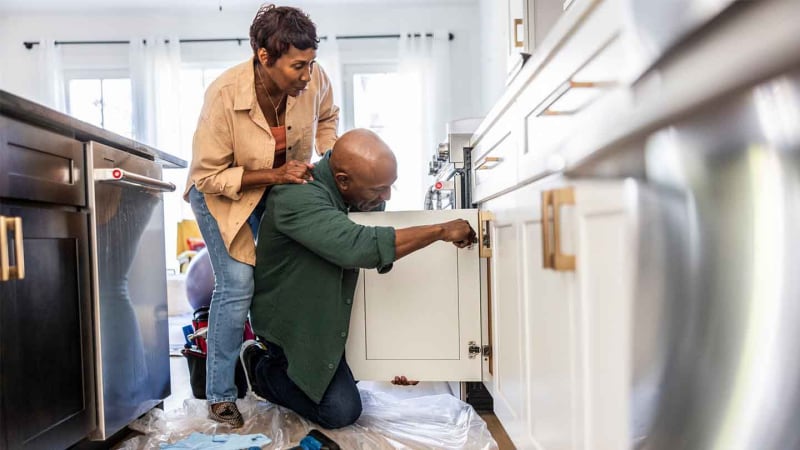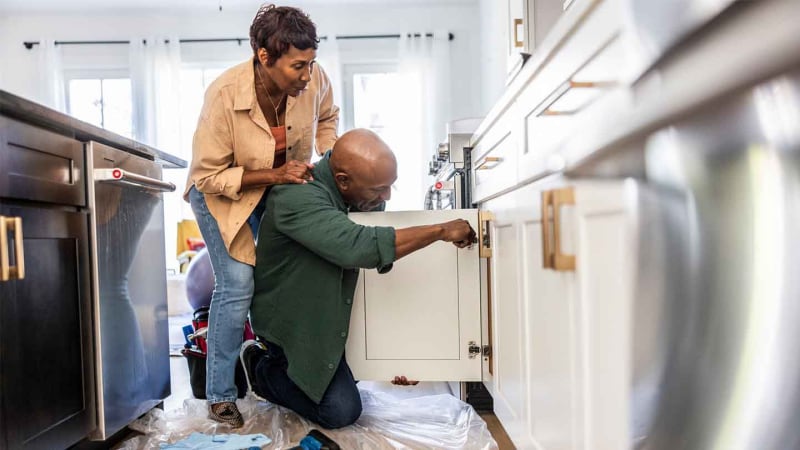VA-guaranteed loans explained and how to get one

Quick insights
- A VA-guaranteed loan is a loan (issued by a private lender) that’s backed by the U.S. Department of Veterans Affairs.
- This loan program provides several benefits, including lower closing costs, competitive interest rates and no down payment requirements in many cases.
- Applying for a VA-guaranteed loan purchase requires an appraisal, along with the submission of a Certificate of Eligibility (COE) to a VA-approved lender.
You’ve served your country. Now, it’s time to settle into a new home you’ve worked hard for. VA-guaranteed loans are a great option to help make your homebuying dreams a bit more affordable.
If you’re curious about how a VA-guaranteed loan works and how you can apply, this guide should help.
What is a VA-guaranteed loan?
Contrary to what the name might suggest, VA-guaranteed loans (also known as VA loans) don’t come directly from the U.S. Department of Veterans Affairs (VA). Instead, the VA merely backs loans issued by private lenders.
This government-backed guarantee covers a portion of the loan in case of a default, reducing the overall risk for lenders. This allows lenders to offer more favorable terms, such as no down payment requirement and competitive interest rates.
The primary goal of VA loans is to make homeownership more achievable for veterans, active-duty service members, eligible members of the Reserve and National Guard and certain surviving spouses.
This loan program can provide significant advantages, including:
- No requirement for private mortgage insurance (PMI)
- Lifetime eligibility and the ability to reuse the benefit
- Competitively low interest rates
- Limited closing costs
Another unique feature of VA-guaranteed loans is the high loan-to-value (LTV) ratio, which allows veterans to qualify for up to 100% financing in most cases. Theoretically, you could finance the entire purchase price of your home without having to worry about a down payment.
Commonly asked questions about the VA home loan guarantee
While VA-guaranteed loans can help veterans and their families, understanding the fine print is key to making the most of this benefit. Here are some of the most commonly asked questions about the program:
What do you need to qualify for a VA loan?
To qualify for VA loan approval, you must be an eligible veteran using the loan for an eligible purpose, and plan to occupy the property as your home.
Other than that, the loan requirements are left to the individual lender. Chase, for example, requires a credit score of at least 620 to qualify. The VA doesn’t dictate minimum credit scores or income requirements, stating merely that “you must have a good credit record,” and “enough income to meet the new mortgage payments on a loan.”
You will also need to provide a Certificate of Eligibility (COE) to your lender. This is proof that you meet the minimum active-duty service requirement.
What is the maximum loan amount on a VA-guaranteed loan?
There isn’t a strict maximum loan amount because the VA doesn’t set a hard limit. Again, this is because the loan won’t be coming directly from the VA. However, the loan can’t exceed the lesser of the appraised value of the home or the purchase price.
Lenders typically follow conforming loan limits (CLLs), which for single-family homes are consistent with the limits set by Fannie Mae® and Freddie Mac®. Lenders usually won’t provide a loan without a down payment for an amount larger than $417,000.
If you’re purchasing property beyond the loan limit, you may need to provide a down payment to bridge the gap. The VA guarantees up to 25% of the loan amount within these limits.
What is the required down payment?
One of the biggest advantages of VA-guaranteed loans is they generally require no down payment. That said, lenders may impose requirements in special circumstances, such as if the loan amount exceeds the property’s appraised value.
Do surviving spouses qualify for a VA-guaranteed loan?
Certain surviving spouses are eligible for VA-guaranteed loans. This includes those whose spouses died during service or due to a service-related disability. As a spouse, your eligibility depends on meeting certain criteria, such as not remarrying before the age of 57. A surviving spouse of a veteran who dies on active duty or from service-connected causes may still be eligible for a COE. If the surviving spouse is remarried on or after age 57, and on or after December 16, 2003, they still may be eligible.
Can you refinance your VA loan?
Veterans have the option of refinancing their VA loans through programs like the Interest Rate Reduction Refinance Loan (IRRRL), which helps reduce interest rates. There’s also a cash-out refinancing option for those looking to use their home equity to access funds.
Can you use your VA-guaranteed loan on multiple properties?
While you can take advantage of the VA loan guaranty home loan program multiple times during your lifetime, it’s typically limited to one property at a time. The property must serve as your primary residence to qualify under VA loan terms.
How to apply for a VA-guaranteed mortgage:
Now that you know the benefits and key features of a VA home loan guarantee, all that’s left is to start the paperwork.
1. Find the property you’d like to buy
VA loans may be used to purchase a single-family home, a condo in a VA-approved complex or even make improvements on a manufactured home. You may even be able to use it as construction financing to build a home, improve a home or make energy-efficient improvements in certain cases.
2. Apply for a loan with your chosen lender
Next, choose a lender that participates in the VA home loan program. Not all lenders are VA-approved, so you’ll need to do your homework to find one that fits your needs.
3. Present your Certificate of Eligibility (COE)
The COE serves as proof that you meet the service and eligibility requirements for a VA loan. You can request this document directly through the VA, or your lender may be able to help you secure it.
To qualify for this document, borrowers must meet specific service guidelines. For example, 90 days of active duty during wartime or 181 days during peacetime.
4. Complete a property appraisal and value estimation
The VA will then assign an appraiser to evaluate the property’s fair market value. An appraisal ensures you’re paying a reasonable price and that the property you wish to buy meets basic safety and habitability standards.
5. Receive your loan
Once everything checks out, your lender will finalize the loan approval. From there, it’s time to sign the paperwork, receive your funding and close on your new home.
Pros and cons of a VA-guaranteed mortgage
If you’re considering a VA-guaranteed mortgage, you should weigh the benefits and potential drawbacks to determine if it’s the right fit for your needs:
Pros
- No down payment requirement: Unlike many traditional loans, VA loans don’t require a down payment in most cases.
- Competitive interest rates: VA loans often come with lower interest rates compared to conventional loans, which may save you significant money over time.
- No private mortgage insurance (PMI): Borrowers aren’t required to pay PMI, reducing monthly costs compared to other types of loans.
- Flexible credit requirements: VA loans are designed to be more lenient on credit qualifications, making it easier to qualify.
- Assistance programs: If borrowers face financial difficulty, the VA may be able to offer additional support to help them avoid foreclosure.
Cons
- Funding fee: VA loans require a one-time funding fee, which can range from 1.25%–3.3% of the loan amount, depending on the down payment, borrower and loan type.
- Primary residence requirement: VA loans can only be used for primary residences, limiting their application for vacation or investment properties.
- Loan limits: While the VA no longer imposes loan limits for eligible borrowers with full entitlement, limits may still apply depending on the lender.
In summary
A VA-guaranteed loan provides veterans and their families with a much-deserved edge in the housing market, offering favorable terms and unique benefits to those who’ve sacrificed so much. If you’re considering a VA loan or have questions, reach out to an experienced lender or your VA counselor for more information.



